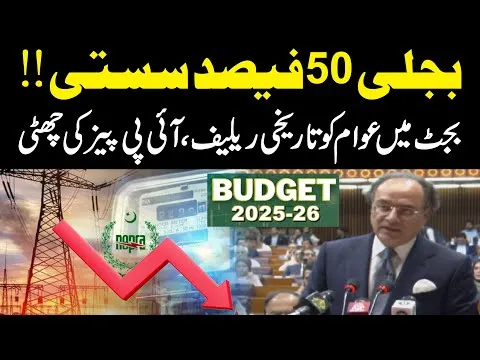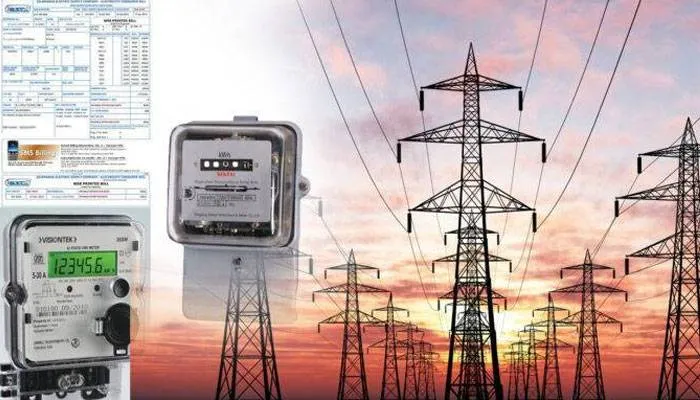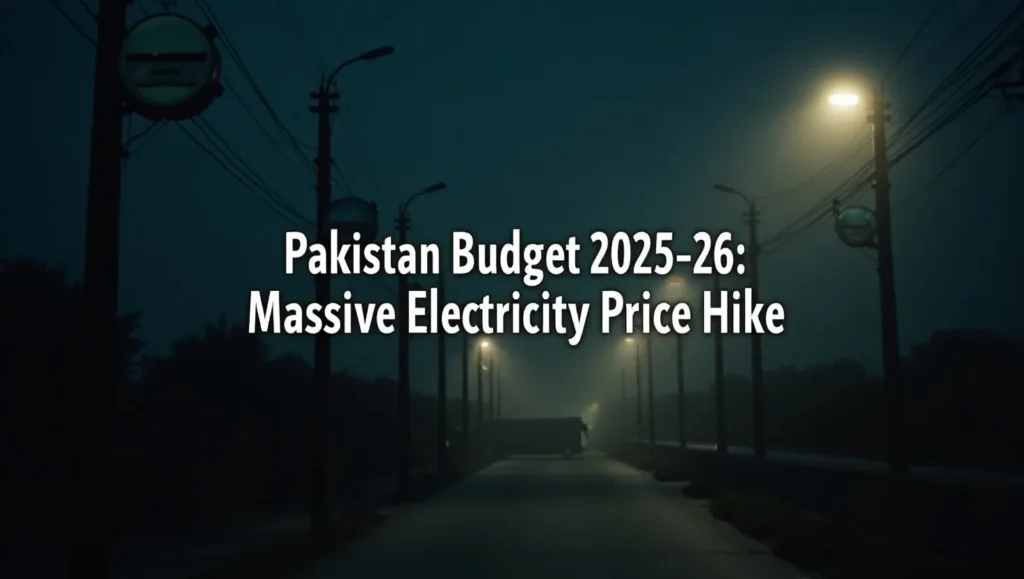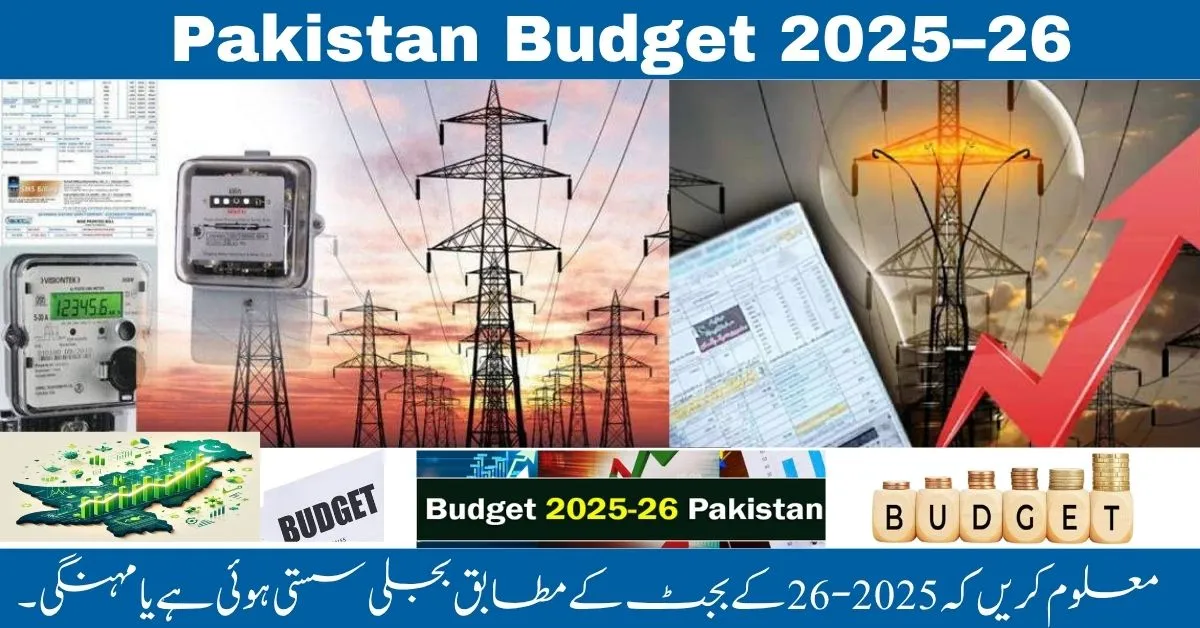Pakistan Budget 2025–26: Massive Electricity Price Hike
The Pakistan Budget 2025–26 has sparked nationwide concern due to a massive electricity price hike that will impact millions of households and businesses. With electricity rates rising sharply, everyday expenses are expected to increase, especially for the middle class already burdened by inflation. The government’s new fiscal policy aims to cut subsidies and meet IMF conditions, but it comes at a heavy cost for ordinary citizens. From higher unit prices to reduced support for energy consumers, this budget is seen as one of the toughest in recent years. In this article, we’ll break down what this price hike means for you and how you can prepare for the changes ahead.
The Federal Budget 2025–26 focuses heavily on increasing revenue through energy reforms. As a result, the power sector has seen sharp changes, particularly in the pricing of electricity. The government says these steps are necessary to fix the economy, but people are not convinced. Let’s explore what’s in this budget and how it will affect your electricity bill.
What’s Inside the Pakistan Budget 2025–26?
The Pakistan Budget 2025–26 has a total outlay of PKR 18.9 trillion, with a revenue target of PKR 12.4 trillion. A big portion of this budget has been allocated to debt repayment, defense, and energy sector reforms. The budget also focuses on reducing subsidies, especially in electricity, fuel, and gas. The government argues that cutting subsidies is essential to meet IMF bailout conditions and stabilize the economy.
According to official budget documents, PKR 2.1 trillion will be directed towards the energy sector, mostly for infrastructure and circular debt management. However, the price of electricity per unit has been increased to reduce government spending. Consumers are now expected to pay more per unit, especially during peak hours.

Electricity Price Hike: Who’s Affected and How Bad Is It?
The new power tariff has hit both residential and commercial users. For residential users, the price per unit has gone up by PKR 5 to PKR 7 depending on consumption. Small users who consume less than 100 units will now pay PKR 14 per unit, while those using above 300 units will pay over PKR 40 per unit.
In comparison, commercial and industrial users will see a hike of 15% to 20% in their bills. This will directly affect small businesses, bakeries, shops, and even tuition centers. According to the National Electric Power Regulatory Authority (NEPRA), the changes are meant to help recover circular debt, which has crossed PKR 3.6 trillion this year.
| Consumer Type | Units Used | Old Rate (PKR) | New Rate (PKR) |
|---|---|---|---|
| Residential | 1-100 | 10.50 | 14.00 |
| Residential | 101-300 | 18.00 | 25.00 |
| Residential | 301+ | 28.00 | 40.00+ |
| Commercial | Any usage | 32.00 avg. | 36.00 – 40.00 |
Why Are Electricity Prices So High in Pakistan Budget 2025–26?
There are many reasons behind the electricity price hike in Pakistan 2025–26. The main reason is the rising circular debt, which happens when the government delays payments to power companies. This leads to borrowing and more debt. The government now owes billions to private power producers.
Another major factor is the IMF bailout deal. As part of the deal, Pakistan had to end power subsidies and increase electricity prices to meet fiscal targets. Fuel prices have also gone up globally, especially LNG and coal, which Pakistan uses to produce electricity. With a weak local currency, importing fuel has become more expensive.
Finance Minister Muhammad Aurangzeb said, “If we don’t fix the power sector now, it will crash our economy later.” Experts also point to the low use of renewable energy, such as solar power, which could have reduced costs.
Public Response: Reactions on Ground and Social Media
The public response to the Pakistan Budget 2025–26 and the electricity price hike has been strong and emotional. Social media platforms like Twitter and Facebook are filled with angry posts, memes, and frustration. Hashtags like #ElectricityBill, #Budget2025 and #Inflation have been trending for days.
People are saying that the middle class is being crushed while politicians remain untouched. Opposition parties like PTI and PPP have called the budget “anti-people” and demanded its revision. Small businesses are especially worried, as they already struggle with high rents and taxes. Some unions are also planning protests in major cities like Lahore, Karachi, and Islamabad.

What’s Next: Can Anything Be Done to Reduce Bills?
To reduce electricity bills in this tough time, experts suggest shifting to solar solutions. The government has promised to offer some subsidies for net metering, allowing people to sell extra electricity back to the grid. If implemented properly, this could help reduce your bills.
Other tips include using energy-efficient appliances, turning off unused devices, and avoiding peak hour usage. You can also install solar panels or UPS systems to reduce dependency on the grid. Some banks are now offering low-interest loans for solar panel installation.
Here are a few practical tips:
| Action | Estimated Saving |
| Switching to LED lights | 20-30% |
| Using inverter ACs | 25% |
| Installing solar panels | 50-70% long term |
| Turning off appliances early | 10-15% |

Will Prices Go Down Later This Year?
At the moment, it seems unlikely. The government is trying to control the economy, and high power tariffs are part of the plan. Unless fuel prices go down or Pakistan increases local power generation, prices may stay high.
The best solution is investing in renewable energy and demanding more transparency in the power sector. Until then, consumers will need to adapt, conserve energy, and push for reforms.
Conclusion
The Pakistan Budget 2025–26: Massive Electricity Price Hike will be remembered for its strong impact on daily life. While the government’s aim is to fix long-term problems, the short-term pain is real. From increased bills to business losses, the common man will bear the brunt of these changes.
However, with smart planning, energy-saving habits, and a push for solar adoption, some of the impact can be softened. It is up to us to find creative ways to survive this difficult year and hope for better days ahead. As always, staying informed and proactive is the best way to cope.







